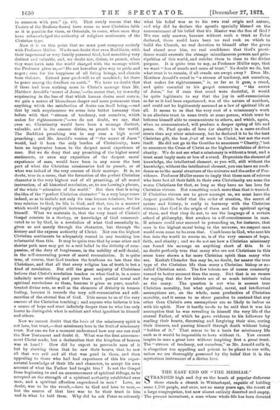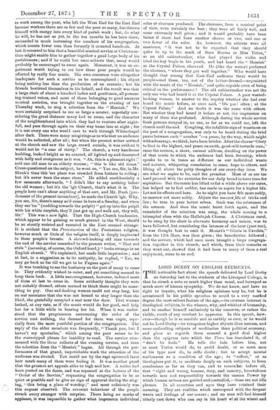THE EAST END ON "THE MESSIAH."
STRANDED high and dry on the beach of popular disfavour there stands a church in Whitechapel, capable of holding ' some 1,700 people, and once, not so many years ago, the resort of a large congregation, but now almost entirely deserted and empty. The present incumbent, a man whose whole life has been devoted to work among the poor, who left the West End for the East End because workers there are so few and the poor so many, has thrown himself with energy into every kind of parish work ; but, do what he will, he has not as yet, in the ten months he has been there, succeeded in much increasing the numbers of his congregation, which counts fewer tens than formerly it counted hundreds. At last it occurred to him that a beautiful musical service at Christmas- time might enable him to gather together a good large body of his parishioners ; and if he could but once achieve that, many would probably be encouraged to come again. Moreover, it was an ex- periment worth trying to see how these poor people would be affected by really fine music. His own resources were altogether inadequate for such a service as he contemplated ; his object being nothing less than the production of an oratorio ; but his friends bestirred themselves in his behalf, and the result was that a large choir of about a hundred ladies and gentlemen, all possess- ing trained voices, and most of them belonging to good amateur musical societies, was brought together on the evening of last Thursday week, to sing a selection from the "Messiah." We were certainly surprised to see so large a muster, especially con: sidering the great distance many had to come, and the character of the neighbourhood into which they had to venture after night- fall, and pass through again on their way home late at night ; for it is not every one who would care to walk through Whitachapel after dark. There were many misgivings as to whether an audience would be collected, after all ; but when the present writer arrived at the church and saw the large crowd outside, it was evident it would not be "a case of thirty." The church, a very handsome building, looked bright as we entered, all lighted up and decorated with holly and evergreens as it was. " Ah, this is a pleasant sight !" said one old man to an elderly woman ; "this is like old times." Cross-questioned on the subject, lie went on, " You see, Sir, in Mr. Blank's time this 'ere place was crowded from bottom to ceiling ; but it's never been the same since." He added confidentially a few moments afterwards, "I didn't like to say nothing before the old woman ; but it's the 'igh Church, that's what it is. The people here can't abear anything of that sort, and Mr. Dash [pre- decessor of the present incumbent], he made the Church 'igh. Why, you see, Sir, there's many all come in here of a Sunday, and when they see 'im "(nodding towards the pulpit) "getup into the pulpit with his white surpliah, they'll just get up and walk out, they will, Sir." This was a new light. That the High-Church tendencies, which appear to be gaining so much ground in the West, should be so stoutly resisted and resented in the East seemed strange. It is evident that the Protestantism of the Protestant religion, however much or little of the religion itself, is deeply implanted in these people's breasts. A shrewd-looking old man towards the end of the service remarked to the present writer, "That red stole" (meaning, of course, the Oxford hood,) "looks strange in an English church." We explained, but made little impression ; and at last, to a suggestion as to its antiquity, he replied, "Yes, we may go back so far till we get to be Pagans again."
It was touching to see the hesitancy on the part of many to come in. They evidently wished to enter, and yet something seemed to keep them back. A little encouragement, however, induced most of them at last to come in. Some evidently thought they were not suitably dressed, others seemed to think there might be some- thing to pay. One sad-looking woman could not stay long, but on our assurance that she was not bound to stay longer than she liked, she gratefully accepted a seat near the door. That woman looked, at any rate, as if the music would do her good, and help her for a little while in bearing her lot. When it was under- stood that the programmes announcing the order of the service cost nothing, the demand for them was eager, espe- cially from the more youthful portion of the congregation. The reply of the older members was frequently, "Thank you, but I haven't my spectacles," which among the poor seems to be the stereotyped phrase for inability to read. The service com- menced with the three collects of the evening service, and then the selection from the " Messiah " began. All through the per- formance of that grand, imperishable work the attention of the audience was riveted. You could see by the rapt upturned faces how much many of them were feeling it. It was another proof that the greatest art appeals alike to high and low. A notice had been posted on the doors, and was repeated at the bottom of the "Order of the Service," requesting the congregation to be as quiet as possible and to give no sign of approval during the sing- ing, "this being a place of worship ;" and most sedulously was this request observed. The reverent behaviour of the people struck every stranger with surprise. There being no marks of applause, it was impossible to gather what impression individual solos or choruses produced. The choruses, from a musical point of view, were certainly the beat ; they were all fairly well, and some extremely well given ; and it would probably have been better if there had been another chorus or two, and one or two fewer of the solos. As, however, the soloists were all amateurs, "it was not to be expected that they should quite be up to the mark of Sims Reeves or Miss Titien," as an old cabinetmaker, who had played the violin and tried the key bugle in his youth, and had heard the "Messiah" at the Crystal Palace, observed. He (like the writer) preferred the choruses, "where they got well together." Who would have thought that among that East-End audience there would be people—and these, too, not of the better-dressed—acquainted with the music of the "Messiah," and quite capable even of being critical on the performance ? The old cabinetmaker was not the only one who had heard it at the Crystal Palace. A poor waated- looking woman, in answer to the inquiry whether she had ever heard the music before, at once said, "Oh yes ! often ; at the Crystal Palace." And no doubt it was the same with others. But whether they had heard it before or not, the impression on many of them was profound. Although during the whole service fresh persons strayed in, no one, as far as we could see, left the church until the end. Coughing, the infallible sign of weariness on the part of a congregation, was only to be heard during the brief pause between each " number "—a pause, by the way, which might with advantage, we think, have been briefer. After the chorus "Glory to God in the highest, and peace on earth, good-will towards men," came the sermon, a short, earnest address, dwelling on the power of that music to which the audience had been listening, which speaks to us in tones as different as our individual wants and natures, whispering consolation to some, hope to others, and lifting all above the petty thoughts of our every-day lives. We are what we aspire to be, said the preacher. Most of us are too hard pressed with the anxieties for our daily bread to have time for aspiration. But the music has lifted us for a while above our cares, has helped us to feel nobler, has made us aspire for a higher life. Let not its effects end here. As to-night you have Mt more nobly, to-morrow act more nobly. Abjure the meaner.life of tricks and lies ; be true to your better selves. Such was the substance of the sermon. And then the music burst forth again, and the remainder of the selection was sung, the whole coming to a triumphal close with the Hallelujah Chorus. A Christmas carol, to be sung by the choir in alternate harmony and unison, was to have followed, but considering the lateness of the hour (past ten), it was thought best to omit it. Mozart's "Gloria in Excelsis," from the 12th Muss, was then given ; the benediction followed ; and the service, which had once more brought a large congrega- tion together in this church, and which, from their remarks as they went out, showed that it had been to many of them a real enjoyment, came to an end.



































 Previous page
Previous page